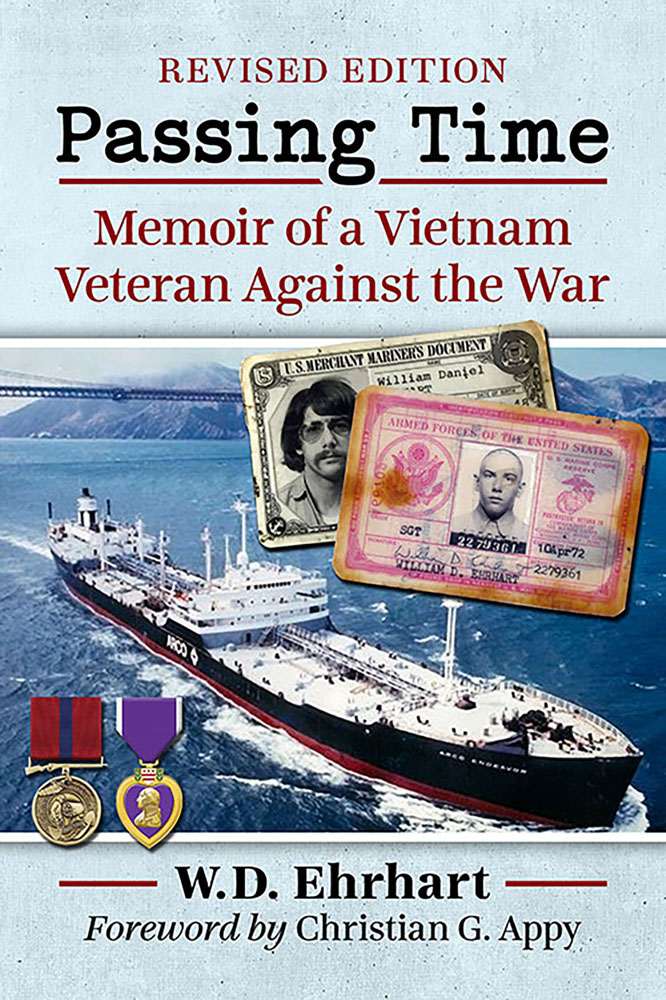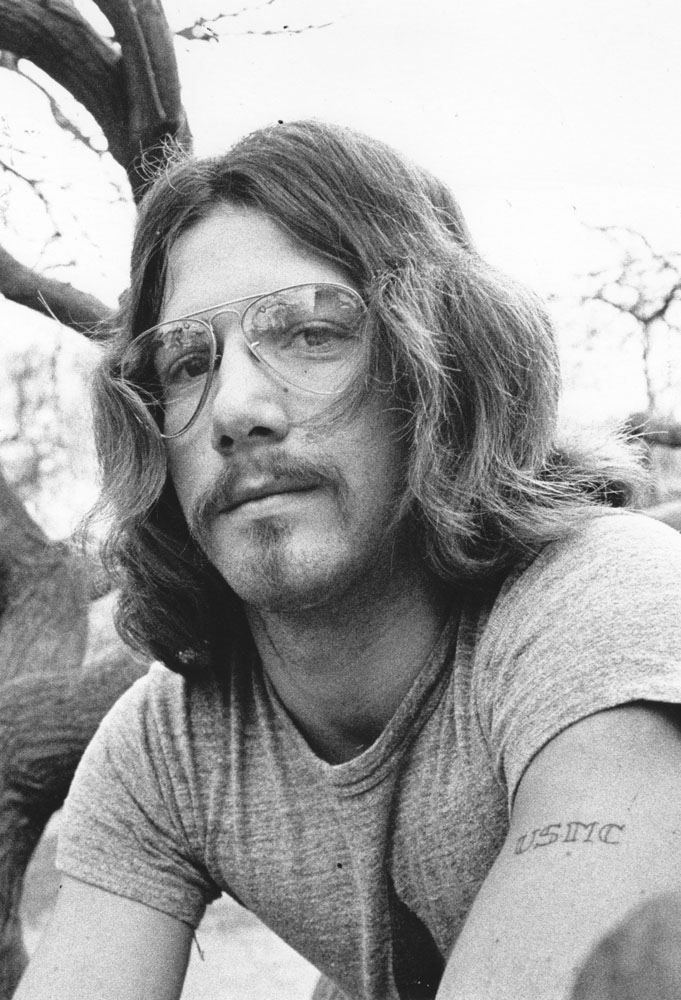 |
Passing Time: Memoir of a Vietnam Veteran Against the WarBy John Ketwig (reviewer)
Passing Time: Memoir of a Vietnam Veteran Against the War Right up front: I am a W.D. Ehrhart fan, although I know him as Bill. About 36 years ago, after reading his incredible book Vietnam-Perkasie, I attended a conference at Gettysburg College specifically because he was scheduled to be there, and we met and have been friends ever since. Somewhere, back in the mists of time when I was scheduled to be in the Philadelphia area on business, Bill and his wife Anne invited me to dinner at their home. We have run into each other many times since, at various anti-war events. I have often described Bill Ehrhart as "the most articulate of all the Vietnam veteran writers." Originally published in 1986 as Marking Time, the current edition of Passing Time is a landmark piece of work. McFarland & Company has purchased the rights and re-issued Vietnam-Perkasie and Busted, both memoirs by Ehrhart, and now they have re-published Passing Time, a third memoir. Also, it must be noted that in 2019, they published Thank You For Your Service: Collected Poems, a magnificent anthology of Bill's life's work as a poet. I have read each and every one. So, now it is time to write a review of Passing Time, and I am experiencing something akin to being speechless. Passing Time is an incredibly powerful book, a collection of random memories all covered in a thick, bitter sauce of recollections of the author's experiences in Vietnam. These are mostly stories of Ehrhart's life after returning from the war, and most of its readers will recognize turbulent feelings from their own past. This is, essentially, the crazy, mixed-up, poignant memories from an earlier time, the last few years of America's war in Vietnam as seen from the perspective of a young, scarred, confused Marine sergeant with a Purple Heart and other "decorations'' as he seeks to adapt the person he has become to a changing, often foreign America. He tries to have a long-term relationship with an assortment of girls, he goes to college (although his book doesn't really say he attends classes), he takes part in an anti-war protest, he travels across the US and Canada, he drinks too much and gets high at every opportunity, and remarkably, he joins the college's water ballet team! Ehrhart spent the summer of 1969 working as a seaman aboard a small Irish freighter traveling between Liverpool and Dublin, but "that lazy, gentle summer finally ended and I went back to crazy America and started college. And America was indeed crazy; utterly stark raving mad – completely bonkers. Year after year, I kept thinking that it had to let up sometime, but it never did. Not Once. It only got worse." The sauce of Vietnam memories dripped over him like gravy over mashed potatoes. After attaining a college degree, he got a job aboard the SS Atlantic Endeavor, a giant oil tanker sailing the western coast of the US and Canada. That's where he met Roger, who listened to Ehrhart rave about the war for a while, then asked, "You really are bitter, aren't you?" "Bitter." Ehrhart replied. "Angry. A whole lot of things. I think too much, that's all." Throughout the book, Bill Ehrhart bounces like a ping pong ball in a hurricane, from Vietnam to a fascination with the sea, from college classrooms to dormitory rooms with feminine company, and to the homes of friends, former soldiers, girlfriends, or students, always searching for a peace that his memories of the war will never allow. Sound familiar? On page 95, he tells us: "God almighty, I'd only tried to do my duty as my duty had been taught to me by parents, teachers, and elders of every stripe. I had done what my nation had asked of me. How much longer would I have to go on paying for it? There were times in the dead of night, alone with my thoughts and nightmares, when I almost wished that nameless, faceless NVA rocketeer who'd splattered me with steel slivers in Hue City had been a better shot. He couldn't have missed my head by more than a foot, perhaps less, we'd calculated later. How many times have those few inches come back to taunt me?" "Not that anyone at Swarthmore (the college he attended) ever realized the turmoil that was tearing at me. The great myth of war holds that combat is the ultimate test of manhood, and that once a man has been to war he has been initiated into the realm of greater wisdom. He has been to the mountain and stared into the great abyss beyond, and having done so, the ordinary concerns of mortal beings can never again hold real importance or significance, dwarfed as they are by the brilliant clarity of the struggle between life and death." "And in spite of my classmates' passionate opposition to the war in Vietnam, most if not all of them had bought into the myth as readily as any blue-collar kid from South Boston." On page 108, Ehrhart tells the Swarthmore Rotary Club: "How many more Americans must die to justify the thousands that have already died? How many more billions of dollars that could have been spent for the needs of Americans will go up in useless smoke and flame in Vietnam? There comes a time when American patriots must urge peace instead of war. Henry David Thoreau went to jail rather than pay taxes to support the American war in Mexico. Yet today Thoreau is revered and respected. Who will be the heroes of the Vietnam War? Men like me who fought there, or those who argue for an end to further killing and senseless destruction? Those who answer every broken illusion with still more violence, or those who recognize that there are better places and better circumstances in which to defend the cause of freedom? When the most powerful nation on earth ceaselessly pounds and pummels a nation of rice farmers and fishermen, where is the honor? Why are we so determined to save the Vietnamese, who so clearly do not want or understand our help? Worst of all, the war in Vietnam is tearing our own country apart. The demonstrations and protests grow in number, size, and anger by the week, and the backlash response increases correspondingly – and now Americans are killing other Americans in the streets of America. It is time to stop trying to save Vietnam and begin trying to save America." Or, on page 156: "I guess everybody that went through Vietnam came out of it differently. It's a hard thing to admit that your own government sucker-punched you. I guess a lot of guys just can't cope with it. Look at all the Vietnam veterans ending up in prison, ending up as junkies or suicides, ending up with less-than-honorable discharges. You just can't tell me that somehow my whole generation turned out to be nothing but a bunch of fuckups. All those guys are hurtin' inside. They got burned and they don't know how to deal with it." "Then," on page 188, "in late June, thanks to a man named Daniel Ellsberg, The Pentagon Papers found the light of day; I'd bought a paperback copy of the New York Times edition and begun to read." "It had been a journey through an unholy house of horrors where all one's worst fears and darkest nightmares had suddenly become reality, hard, cold, and immutable; where all of the ugliest questions that had first arisen in the rice fields and jungles of Vietnam had suddenly been answered in the starkest and most immutable terms; where everything I had believed in for eighteen years and had desperately tried to cling to through four more years of pestilence and famine had suddenly crumbled into ashes – ashes so thick you could hardly breathe, bitter, dry, and suffocating. A mistake? Vietnam a mistake? My God, it had been a calculated, deliberate attempt to hammer the world by brute force into the shape perceived by vain, duplicitous power brokers. And the depths to which they had sunk, dragging us all down with them, were almost unfathomable. America, America, God cast his shame on thee." This book is like being sentenced to spend the rest of your life treading water in a vast sea of shit, struggling to keep your head above water, and discovering that you are not the only one. Bill Ehrhart is there with you, and he has a raft. He welcomes you to grab ahold and ride with him a while, to paddle and kick and travel on a crazy, desperate tour of America back in the early '80s. Yes, it is worse today, but Bill Ehrhart's books are lifesavers. He thought he was just Passing Time, and many of us were there with him, but today a large majority of us can look back on successful careers and kids who were brought up with decent values, and grandchildren who are worth it all. Passing Time is a terrific book, filled to overflowing with nostalgia, regrets, and wisdom. Highly recommended! John Ketwig is a lifetime member of VVAW. He is the author of ?and a hard rain fell, and Vietnam Reconsidered: The War, the Times, and Why They Matter.
|



